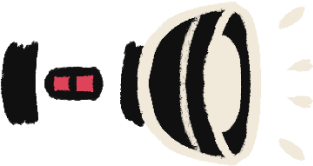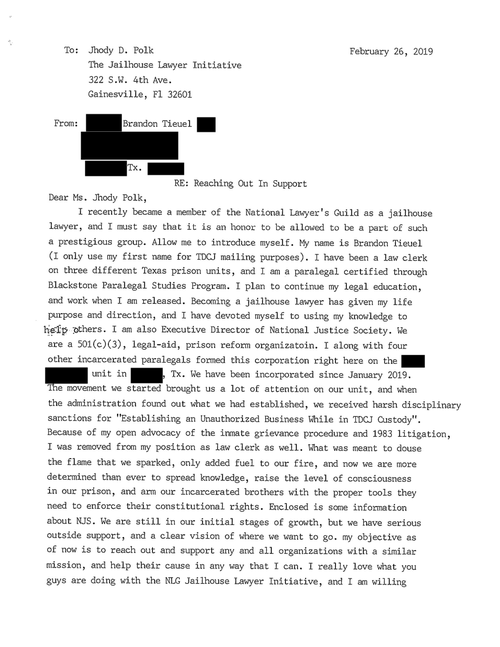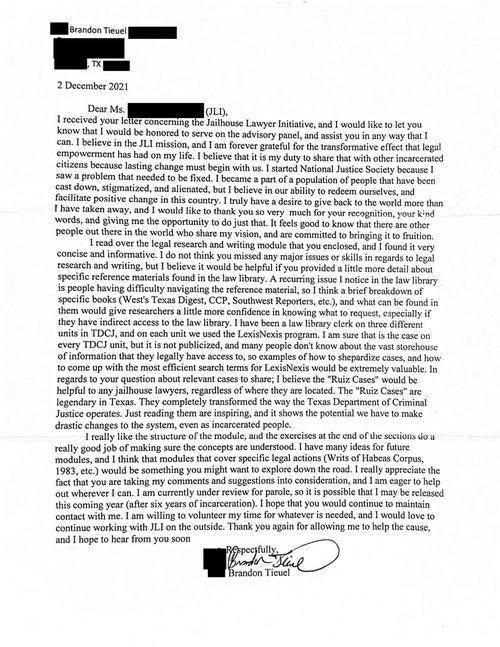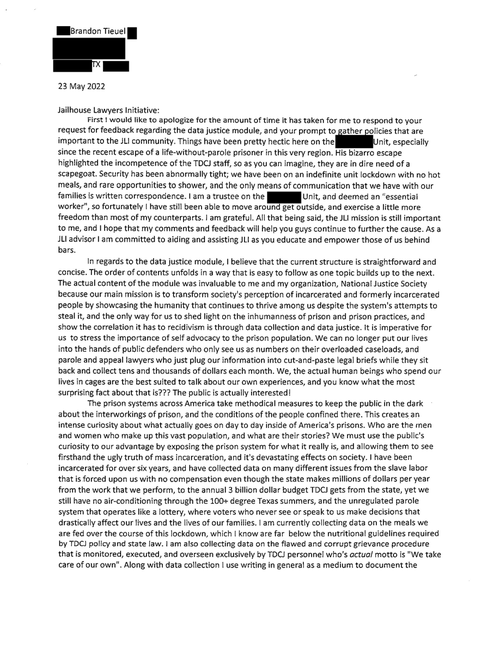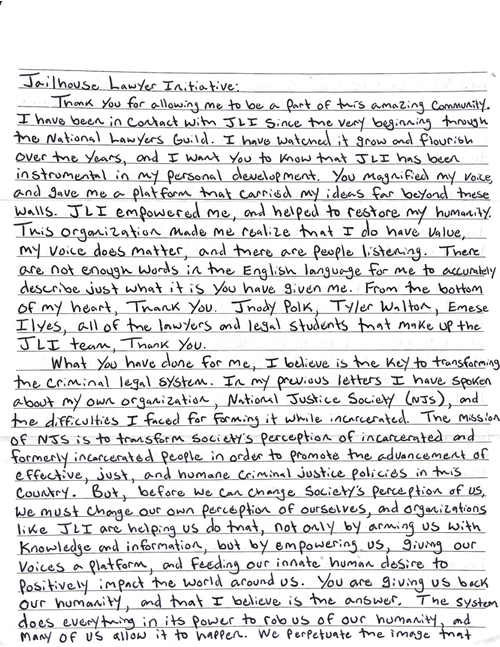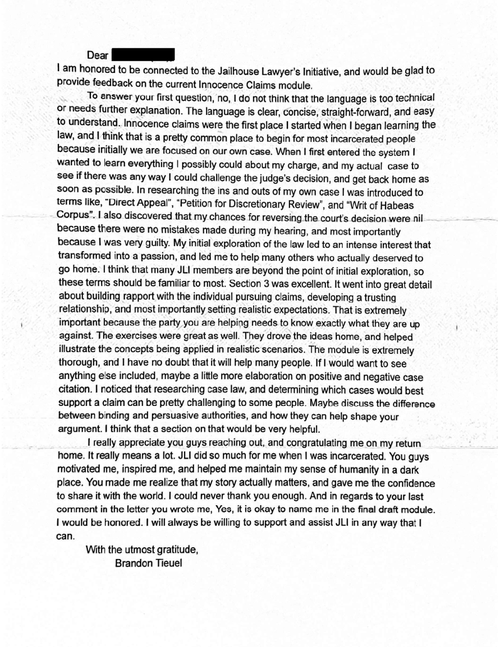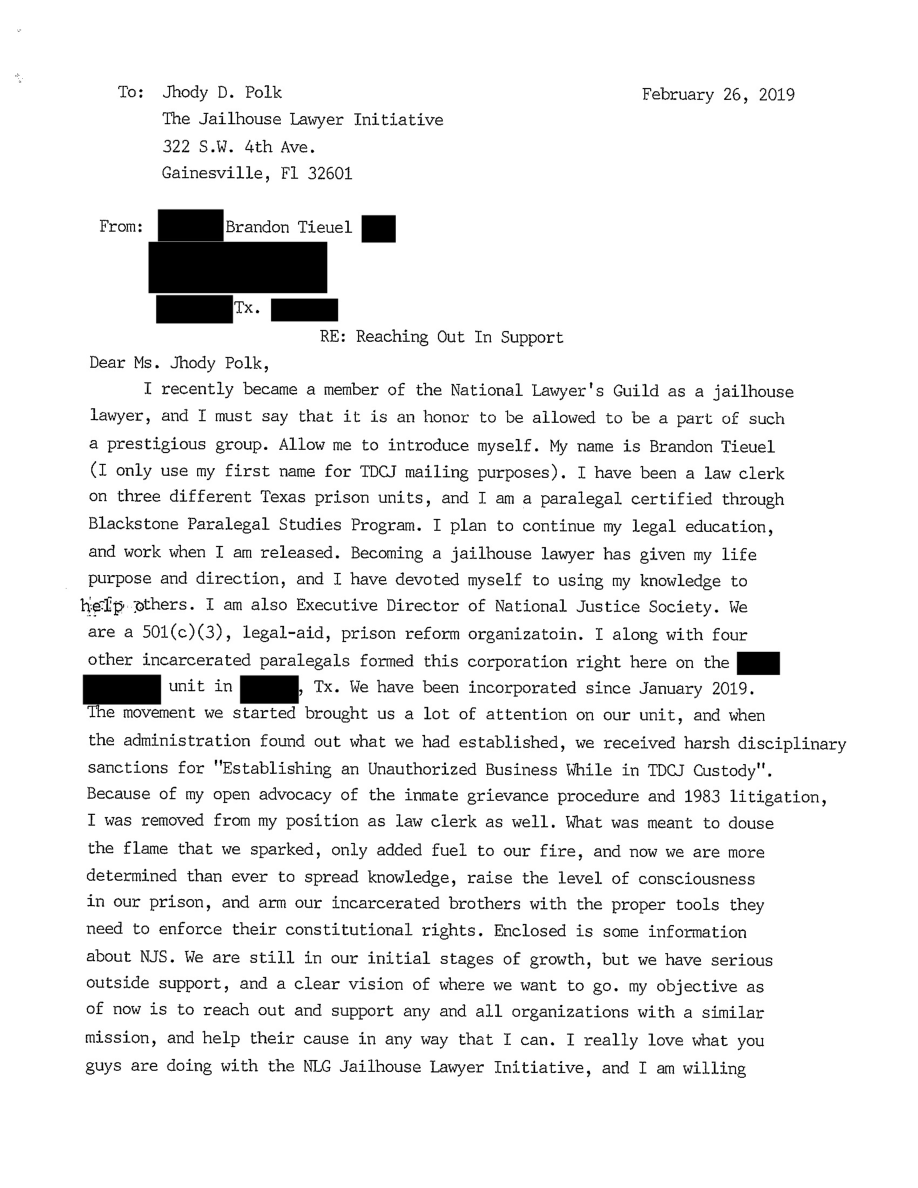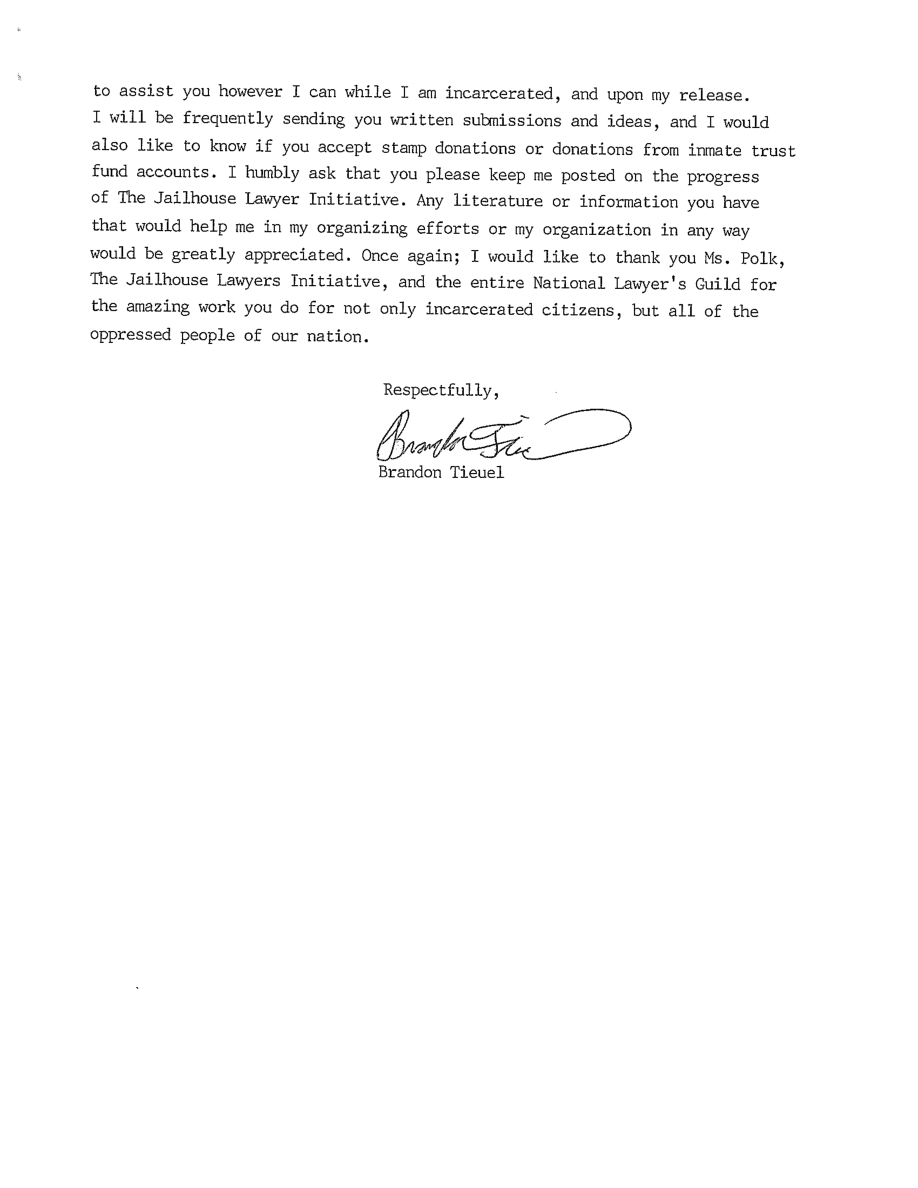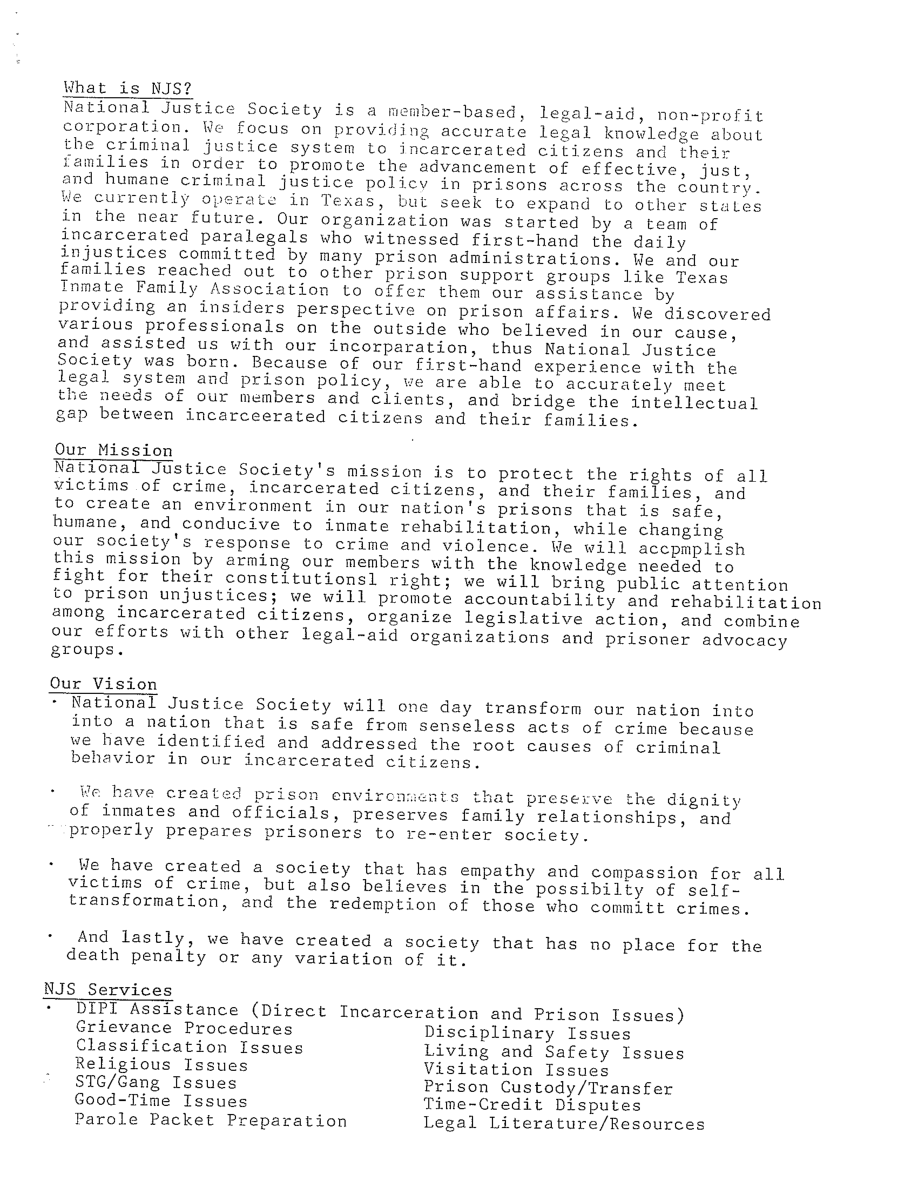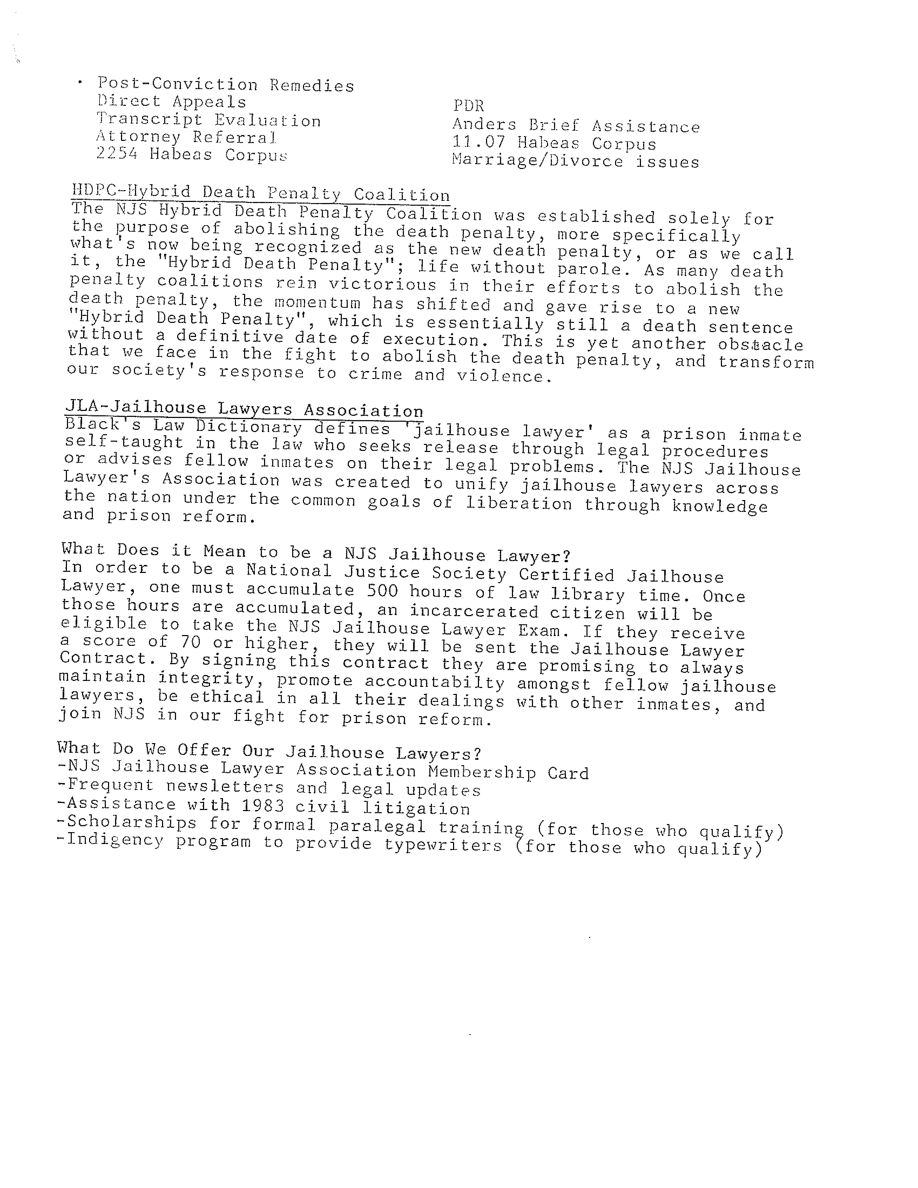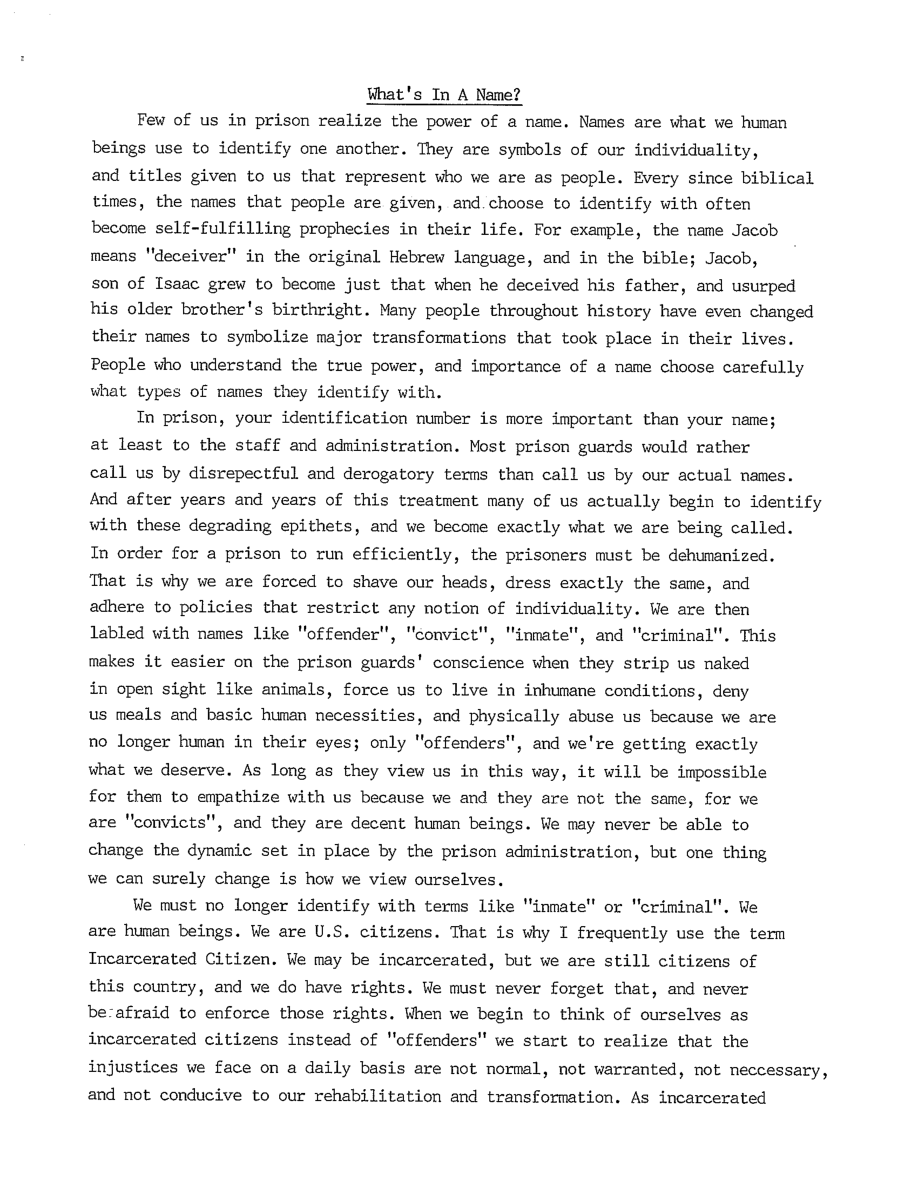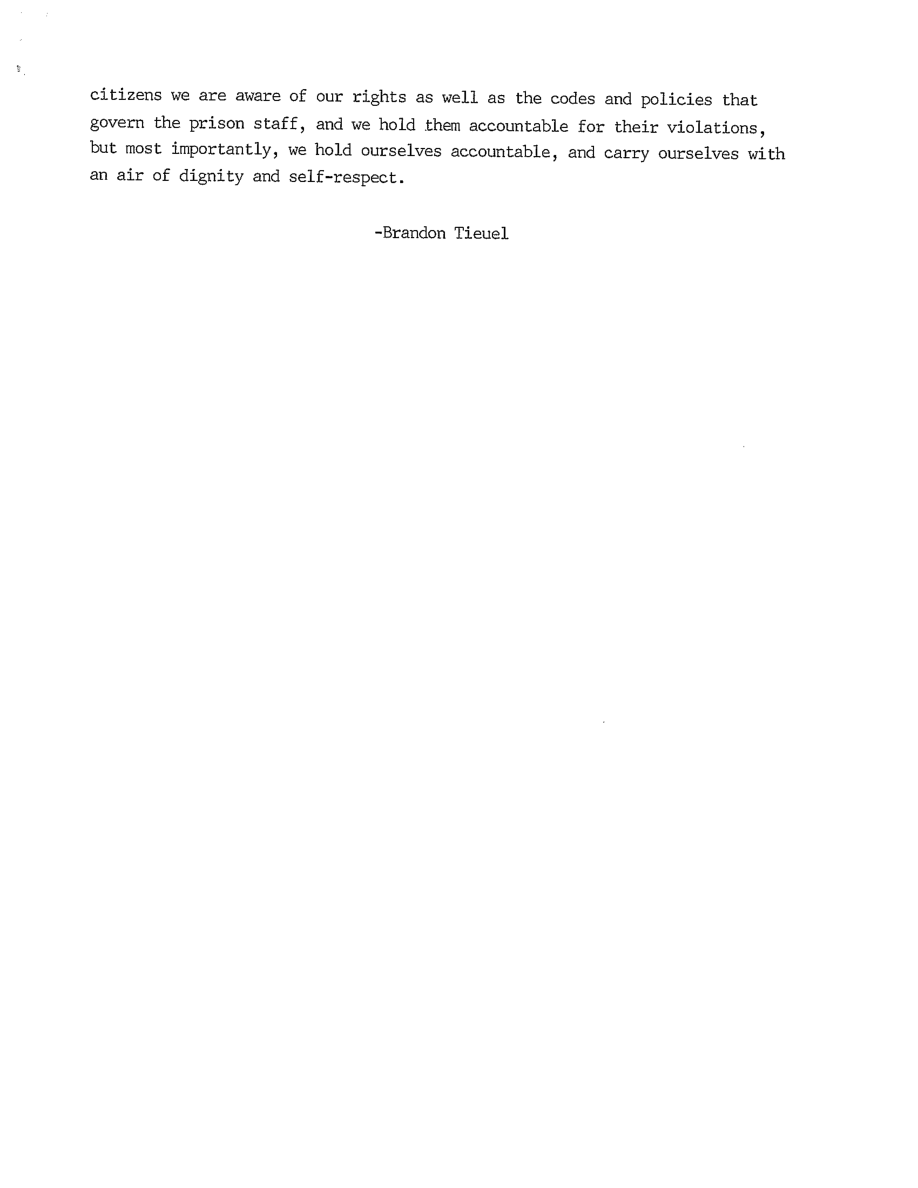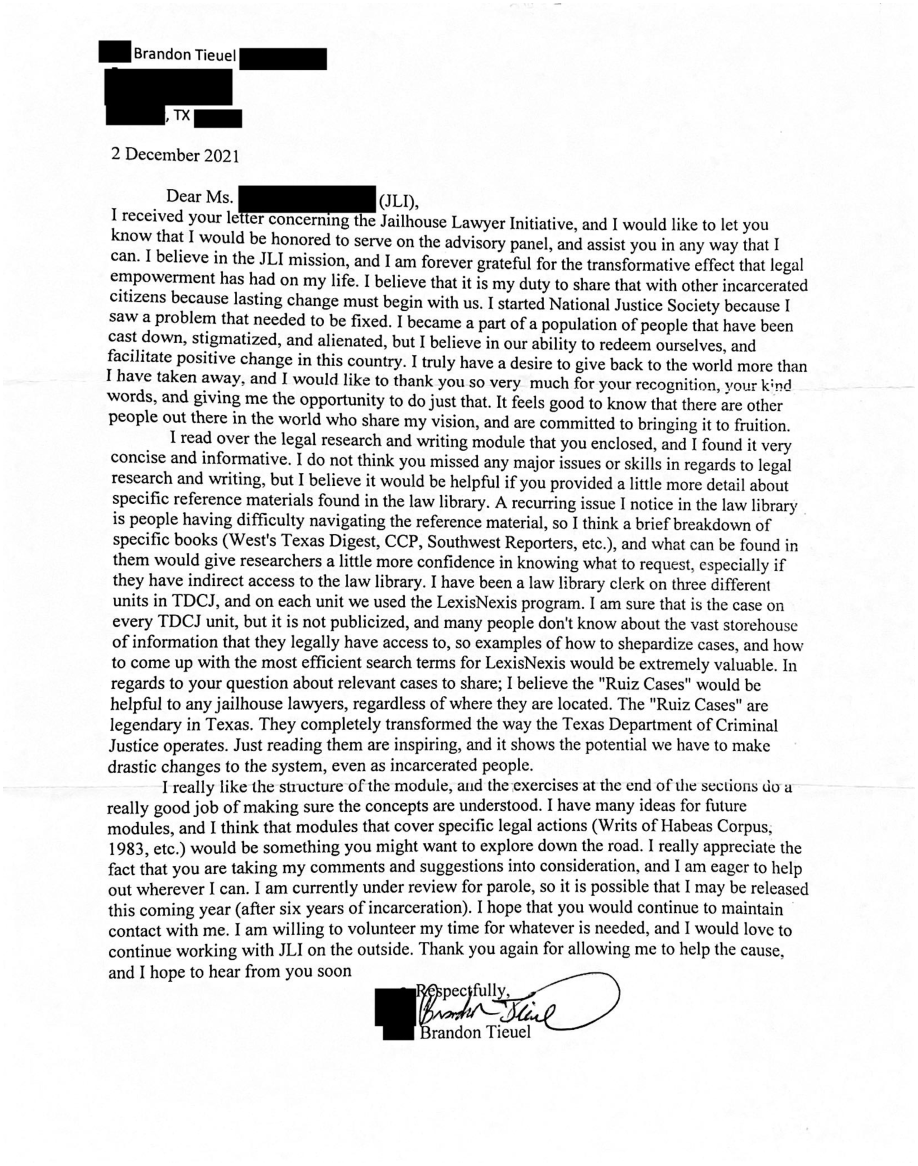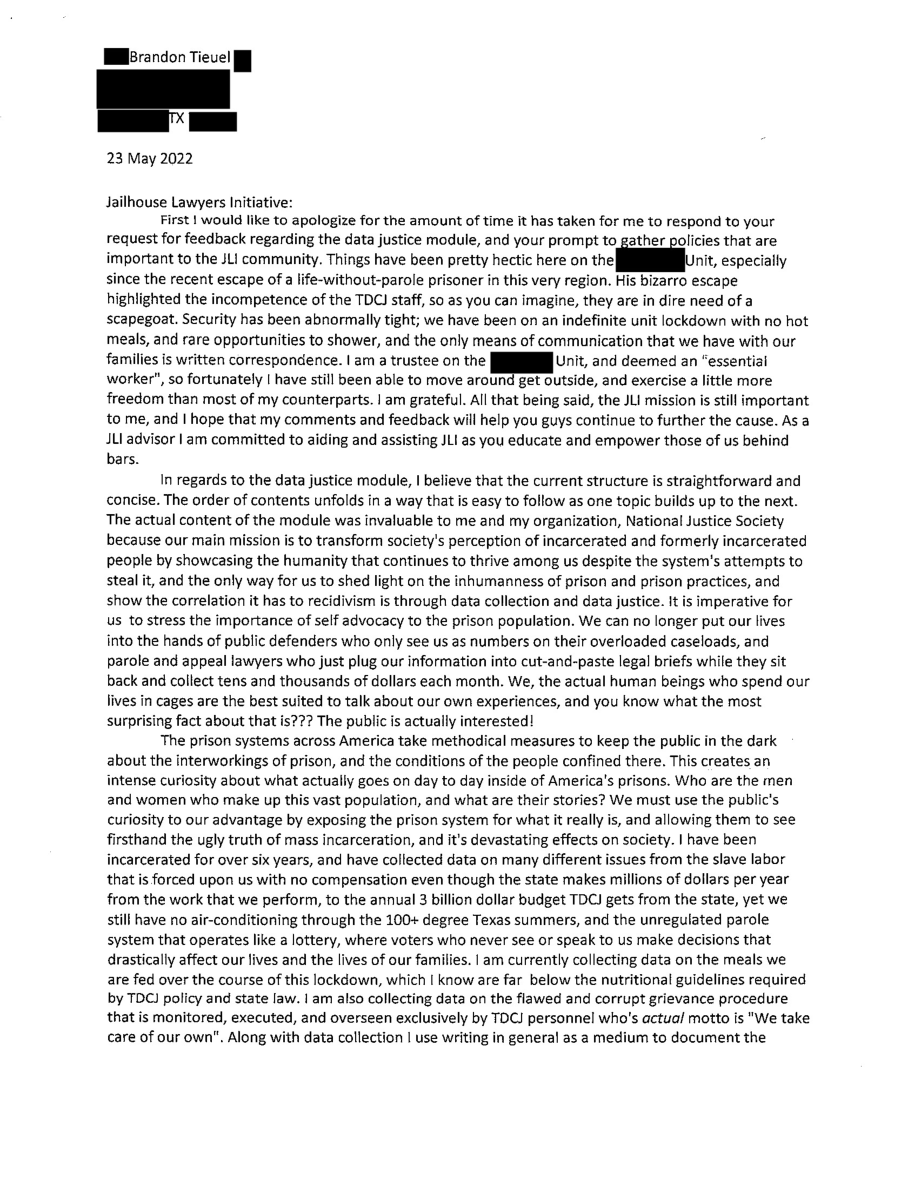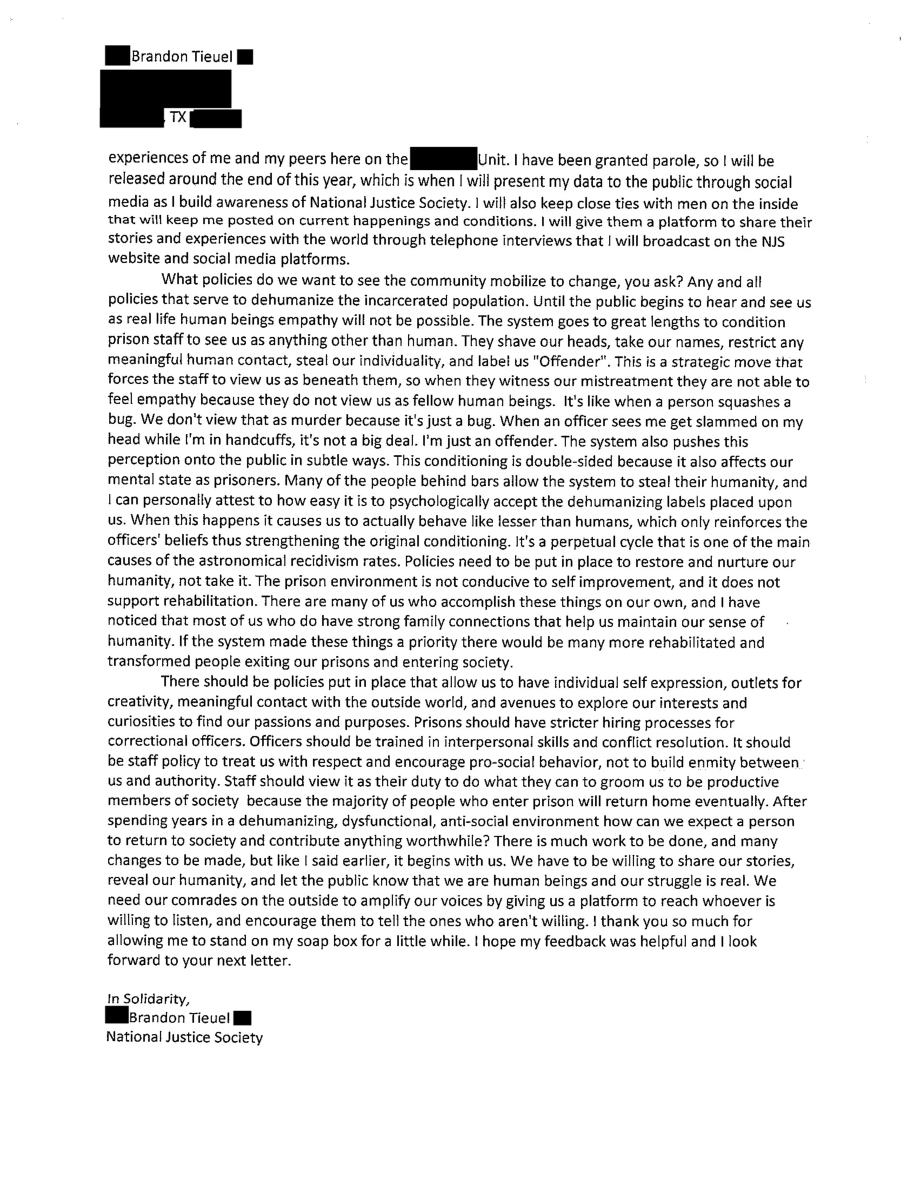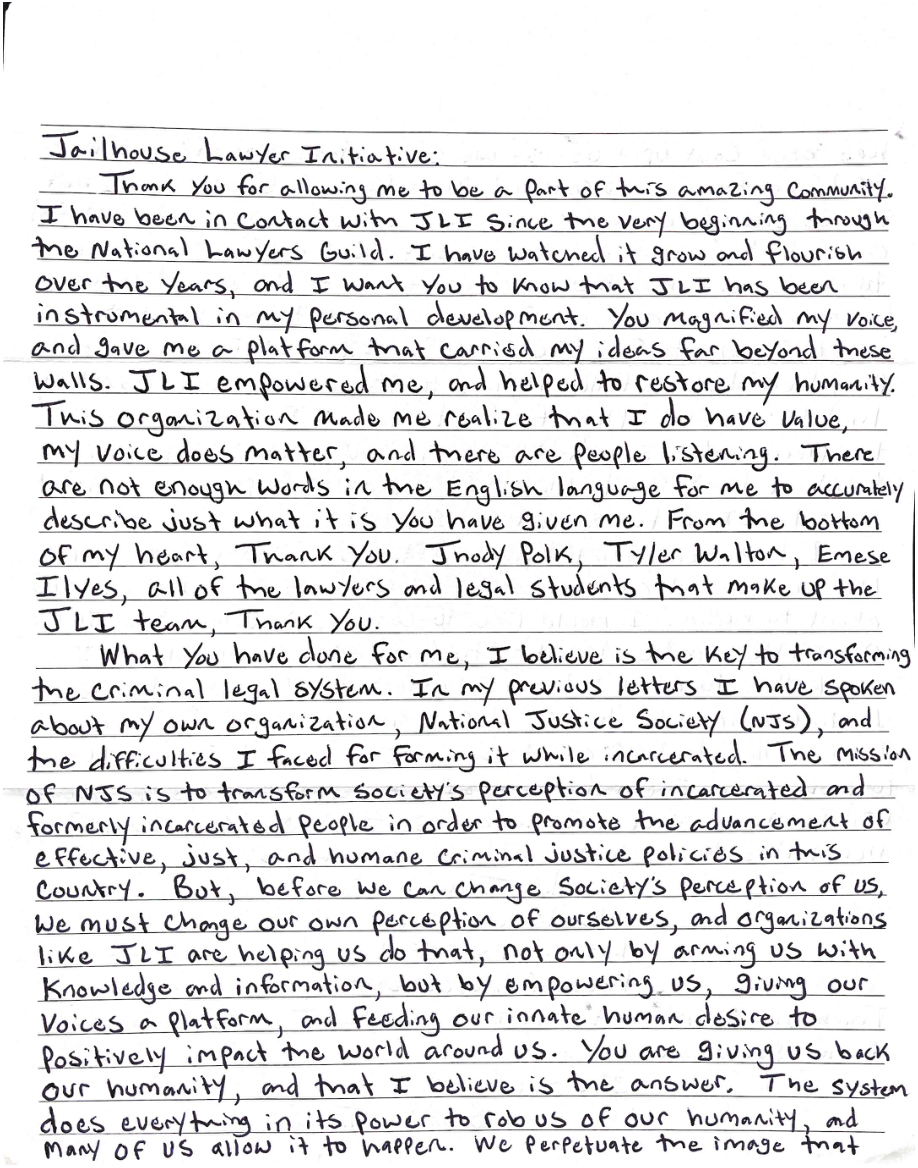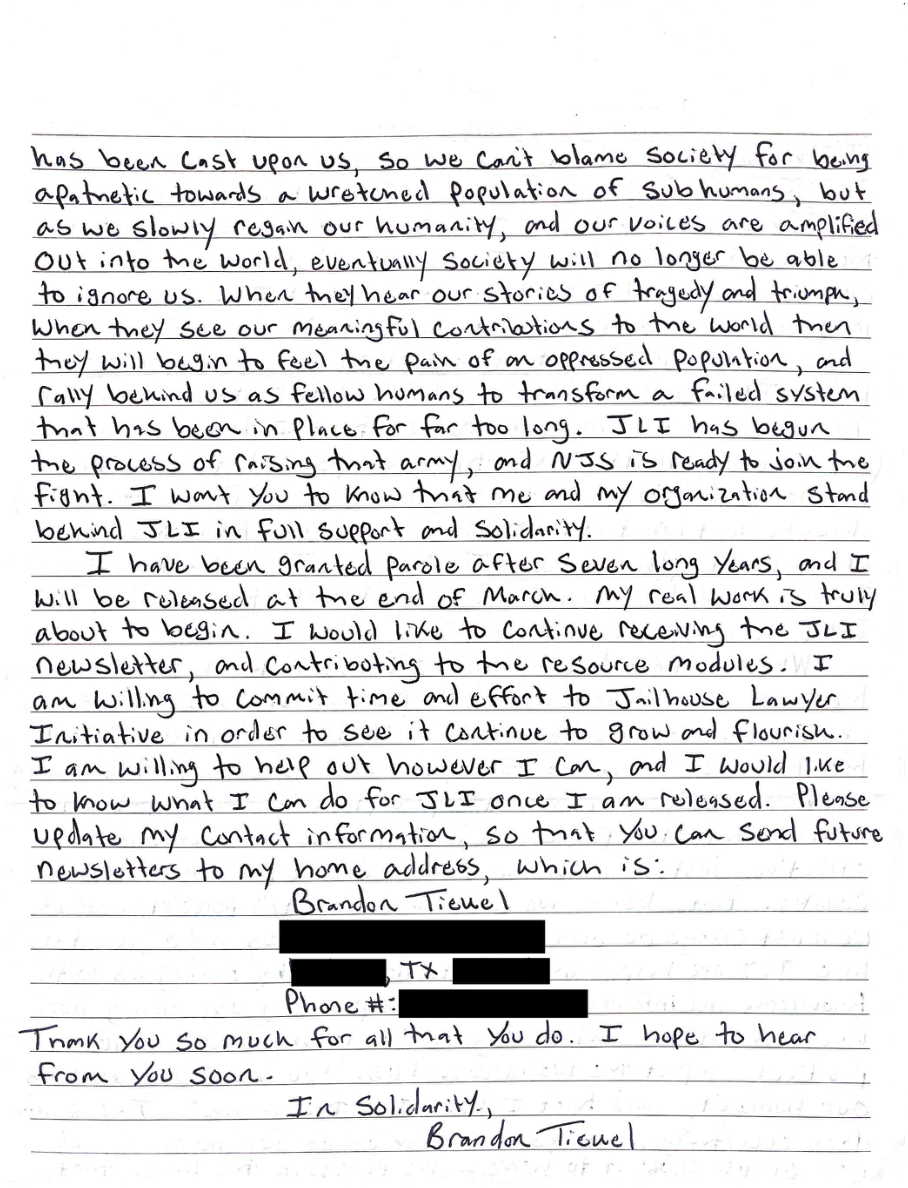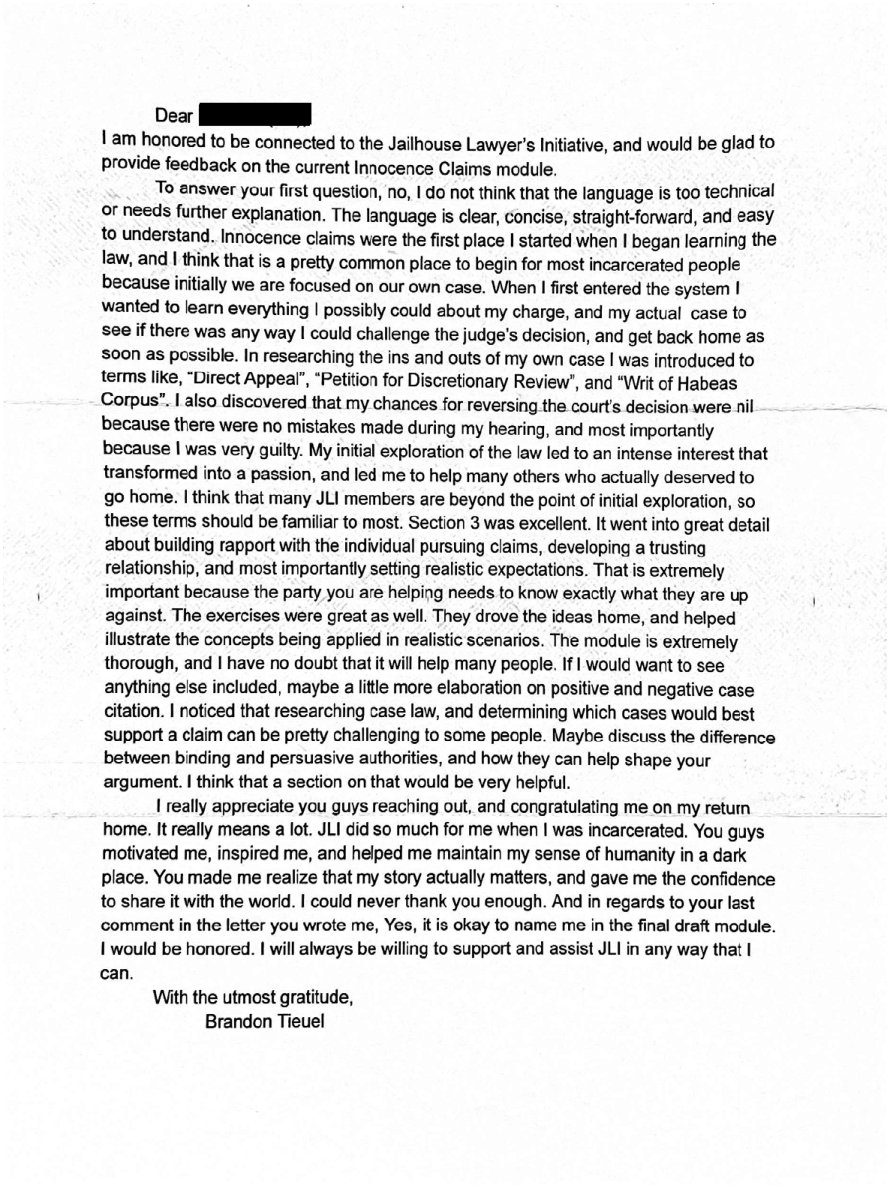Brandon Tieuel
I wish the world could read this letter so that they could know this:Brandon Tieuel
transcription
Dear Ms. Jhody Polk,
I recently became a member of the National Lawyer's Guild as a jailhouse
lawyer, and I must say that it is an honor to be allowed to be a part of such
a prestigious group. Allow me to introduce myself. My name is Brandon Tieuel
(I only use my first name for TDCJ mailing purposes). I have been a law clerk
on three different Texas prison units, and I am a paralegal certified through
Blackstone Paralegal Studies Program. I plan to continue my legal education,
and work when I am released. Becoming a jailhouse lawyer has given my life
purpose and direction, and I have devoted myself to using my knowledge to
help others. I am also Executive Director of National Justice Society. We
are a 501(c)(3), legal-aid, prison reform organization. I along with four
other incarcerated paralegals formed this corporation right here on the [Redacted], Tx. We have been incorporated since January 2019.
The movement we started brought us a lot of attention on our unit, and when
the administration found out what we had established, we received harsh disciplinary
sanctions for "Establishing an Unauthorized Business While in TDCJ Custody".
Because of my open advocacy of the inmate grievance procedure and 1983 litigation,
I was removed from my position as law clerk as well. What was meant to douse
the flame that we sparked, only added fuel to our fire, and now we are more
determined than ever to spread knowledge, raise the level of consciousness
in our prison, and arm our incarcerated brothers with the proper tools they
need to enforce their constitutional rights. Enclosed is some information
about NJS. We are still in our initial stages of growth, but we have serious
outside support, and a clear vision of where we want to go. my objective as
of now is to reach out and support any and all organizations with a similar
mission, and help their cause in any way that I can. I really love what you
guys are doing with the Jailhouse Lawyer Initiative, and I am willing
to assist you however I can while I am incarcerated, and upon my release.
I will be frequently sending you written submissions and ideas, and I would
also like to know if you accept stamp donations or donations from inmate trust
fund accounts. I humbly ask that you please keep me posted on the progress
of The Jailhouse Lawyer Initiative. Any literature or information you have
that would help me in my organizing efforts or my organization in any way
would be greatly appreciated. Once again; I would like to thank you Ms. Polk,
The Jailhouse Lawyers Initiative, and the entire National Lawyer's Guild for
the amazing work you do for not only incarcerated citizens, but all of the
oppressed people of our nation.
Respectfully,
Brandon Tieuel
What is NJS?
National Justice Society is a member-based, legal-aid, non-profit
corporation. We focus on providing accurate legal knowledge about
the criminal justice system to incarcerated citizens and their
families in order to promote the advancement of effective, just,
and humane criminal justice policy in prisons across the country.
We currently operate in Texas, but seek to expand to other states
in the near future. Our organization was started by a team of
incarcerated paralegals who witnessed first-hand the daily
injustices committed by many prison administrations. We and our
families reached out to other prison support groups like Texas
Inmate Family Association to offer them our assistance by
providing an insiders perspective on prison affairs. We discovered
various professionals on the outside who believed in our cause,
and assisted us with our incorporation, thus National Justice
Society was born. Because of our first-hand experience with the
legal system and prison policy, we are able to accurately meet
the needs of our members and clients, and bridge the intellectual
gap between incarcerated citizens and their families.
Our Mission
National Justice Society's mission is to protect the rights of all
victims of crime, incarcerated citizens, and their families, and
to create an environment in our nation's prisons that is safe,
humane, and conducive to inmate rehabilitation, while changing
our society's response to crime and violence. We will accomplish
this mission by arming our members with the knowledge needed to
fight for their constitutional right; we will bring public attention
to prison injustices; we will promote accountability and rehabilitation
among incarcerated citizens, organize legislative action, and combine
our efforts with other legal-aid organizations and prisoner advocacy
groups.
Our Vision
National Justice Society will one day transform our nation into
into a nation that is safe from senseless acts of crime because
we have identified and addressed the root causes of criminal
behavior in our incarcerated citizens.
We have created prison environments that preserve the dignity
of inmates and officials, preserves family relationships, and
properly prepares prisoners to re-enter society.
We have created a society that has empathy and compassion for all
victims of crime, but also believes in the possibility of self-
transformation, and the redemption of those who commit crimes.
And lastly, we have created a society that has no place for the
death penalty or any variation of it.
NJS Services
DIPI Assistance (Direct Incarceration and Prison Issues)
Grievance Procedures
Disciplinary Issues
Living and Safety Issues
Visitation Issues
Prison Custody/Transfer
Time-Credit Disputes
Legal Literature/Resources
Classification Issues
Religious Issues
STG/Gang Issues
Good-Time Issues
Parole Packet Preparation
________________
Post-Conviction Remedies
Direct Appeals
Transcript Evaluation
Attorney Referral
2254 Habeas Corpus
PDR
Anders Brief Assistance
11.07 Habeas Corpus
Marriage/Divorce issues
HDPC-Hybrid Death Penalty Coalition
The NJS Hybrid Death Penalty Coalition was established solely for
the purpose of abolishing the death penalty, more specifically
what's now being recognized as the new death penalty, or as we call
it, the "Hybrid Death Penalty"; life without parole. As many death
penalty coalitions rein victorious in their efforts to abolish the
death penalty, the momentum has shifted and gave rise to a new
"Hybrid Death Penalty", which is essentially still a death sentence
without a definitive date of execution. This is yet another obstacle
that we face in the fight to abolish the death penalty, and transform
our society's response to crime and violence.
JLA-Jailhouse Lawyers Association
Black's Law Dictionary defines 'jailhouse lawyer' as a prison inmate
self-taught in the law who seeks release through legal procedures
or advises fellow inmates on their legal problems. The NJS Jailhouse
Lawyer's Association was created to unify jailhouse lawyers across
the nation under the common goals of liberation through knowledge
and prison reform.
What Does it Mean to be a NJS Jailhouse Lawyer?
In order to be a National Justice Society Certified Jailhouse
Lawyer, one must accumulate 500 hours of law library time. Once
those hours are accumulated, an incarcerated citizen will be
eligible to take the NJS Jailhouse Lawyer Exam. If they receive
a score of 70 or higher, they will be sent the Jailhouse Lawyer
Contract. By signing this contract they are promising to always
maintain integrity, promote accountability amongst fellow jailhouse
lawyers, be ethical in all their dealings with other inmates, and
join NJS in our fight for prison reform.
What Do We Offer Our Jailhouse Lawyers?
-NJS Jailhouse Lawyer Association Membership Card
-Frequent newsletters and legal updates
-Assistance with 1983 civil litigation
-Scholarships for formal paralegal training (for those who qualify)
-Indigency program to provide typewriters (for those who qualify)
________________
What's In A Name?
Few of us in prison realize the power of a name. Names are what we human
beings use to identify one another. They are symbols of our individuality,
and titles given to us that represent who we are as people. Every since biblical
times, the names that people are given, and choose to identify with often
become self-fulfilling prophecies in their life. For example, the name Jacob
means "deceiver" in the original Hebrew language, and in the bible; Jacob,
son of Isaac grew to become just that when he deceived his father, and usurped
his older brother's birthright. Many people throughout history have even changed
their names to symbolize major transformations that took place in their lives.
People who understand the true power, and importance of a name choose carefully
what types of names they identify with.
In prison, your identification number is more important than your name;
at least to the staff and administration. Most prison guards would rather
call us by disrespectful and derogatory terms than call us by our actual names.
And after years and years of this treatment many of us actually begin to identify
with these degrading epithets, and we become exactly what we are being called.
In order for a prison to run efficiently, the prisoners must be dehumanized.
That is why we are forced to shave our heads, dress exactly the same, and
adhere to policies that restrict any notion of individuality. We are then
labeled with names like "offender", "convict", "inmate", and "criminal". This
makes it easier on the prison guards' conscience when they strip us naked
in open sight like animals, force us to live in inhumane conditions, deny
us meals and basic human necessities, and physically abuse us because we are
no longer human in their eyes; only "'offenders", and we're getting exactly
what we deserve. As long as they view us in this way, it will be impossible
for them to empathize with us because we and they are not the same, for we
are "convicts", and they are decent human beings. We may never be able to
change the dynamic set in place by the prison administration, but one thing
we can surely change is how we view ourselves.
We must no longer identify with terms like "inmate" or "criminal". We
are human beings. We are U.S. citizens. That is why I frequently use the term
Incarcerated Citizen. We may be incarcerated, but we are still citizens of
this country, and we do have rights. We must never forget that, and never
be afraid to enforce those rights. When we begin to think of ourselves as
incarcerated citizens instead of "offenders" we start to realize that the
injustices we face on a daily basis are not normal, not warranted, not necessary,
and not conducive to our rehabilitation and transformation. As incarcerated
________________
citizens we are aware of our rights as well as the codes and policies that
govern the prison staff, and we hold them accountable for their violations,
but most importantly, we hold ourselves accountable, and carry ourselves with
an air of dignity and self-respect.
-Brandon Tieuel
________________
Brandon Tieuel
transcription
Dear [redacted] JLI
I received your letter concerning the Jailhouse Lawyer Initiative, and I would like to let you know that I would be honored to serve on the advisory panel, and assist you in any way that I can. I believe in the JLI mission, and I am forever grateful for the transformative effect that legal empowerment has had on my life. I believe that it is my duty to share that with other incarcerated citizens because lasting change must begin with us. I started National Justice Society because I saw a problem that needed to be fixed. I became a part of a population of people that have been cast down, stigmatized, and alienated, but I believe in our ability to redeem ourselves, and facilitate positive change in this country. I truly have a desire to give back to the world more than I have taken away, and I would like to thank you so very much for your recognition, your kind words, and giving me the opportunity to do just that. It feels good to know that there are other people out there in the world who share my vision, and are committed to bringing it to fruition.
I read over the legal research and writing module that you enclosed, and I found it very concise and informative. I do not think you missed any major issues or skills in regards to legal research and writing, but I believe it would be helpful if you provided a little more detail about specific reference materials found in the law library. A recurring issue I notice in the law library is people having difficulty navigating the reference material, so I think a brief breakdown of specific books (West's Texas Digest, CCP, Southwest Reporters, etc.), and what can be found in them would give researchers a little more confidence in knowing what to request, especially if they have indirect access to the law library. I have been a law library clerk on three different units in TDCJ, and on each unit we used the LexisNexis program. I am sure that is the case on every TDCJ unit, but it is not publicized, and many people don't know about the vast storehouse of information that they legally have access to, so examples of how to shepardize cases, and how to come up with the most efficient search terms for LexisNexis would be extremely valuable. In regards to your question about relevant cases to share; I believe the "Ruiz Cases" would be helpful to any jailhouse lawyers, regardless of where they are located. The "Ruiz Cases" are legendary in Texas. They completely transformed the way the Texas Department of Criminal Justice operates. Just reading them are inspiring, and it shows the potential we have to make drastic changes to the system, even as incarcerated people.
I really like the structure of the module, and the exercises at the end of the sections do a really good job of making sure the concepts are understood. I have many ideas for future modules, and I think that modules that cover specific legal actions (Writs of Habeas Corpus, 1983, etc.) would be something you might want to explore down the road. I really appreciate the fact that you are taking my comments and suggestions into consideration, and I am eager to help out wherever I can. I am currently under review for parole, so it is possible that I may be released this coming year (after six years of incarceration). I hope that you would continue to maintain contact with me. I am willing to volunteer my time for whatever is needed, and I would love to continue working with JLI on the outside. Thank you again for allowing me to help the cause, and I hope to hear from you soon
Respectfully,
Brandon Tieuel
Brandon Tieuel
transcription
Jailhouse Lawyers Initiative:
First I would like to apologize for the amount of time it has taken for me to respond to your request for feedback regarding the data justice module, and your prompt to gather policies that are important to the JLI community. Things have been pretty hectic here on the [redacted] Unit, especially since the recent escape of a life-without-parole prisoner in this very region. His bizarro escape highlighted the incompetence of the TDCI staff, so as you can imagine, they are in dire need of a scapegoat. Security has been abnormally tight; we have been on an indefinite unit lockdown with no hot meals, and rare opportunities to shower, and the only means of communication that we have with our families is written correspondence. I am a trustee on the [redacted] Unit, and deemed an "essential worker", so fortunately I have still been able to move around get outside, and exercise a little more freedom than most of my counterparts. I am grateful. All that being said, the JLI mission is still important to me, and I hope that my comments and feedback will help you guys continue to further the cause. As a JLI advisor I am committed to aiding and assisting JLI as you educate and empower those of us behind bars.
In regards to the data justice module, I believe that the current structure is straightforward and concise. The order of contents unfolds in a way that is easy to follow as one topic builds up to the next. The actual content of the module was invaluable to me and my organization, National Justice Society because our main mission is to transform society's perception of incarcerated and formerly incarcerated people by showcasing the humanity that continues to thrive among us despite the system's attempts to steal it, and the only way for us to shed light on the inhumanness of prison and prison practices, and show the correlation it has to recidivism is through data collection and data justice. It is imperative for us to stress the importance of self advocacy to the prison population. We can no longer put our lives into the hands of public defenders who only see us as numbers on their overloaded caseloads, and parole and appeal lawyers who just plug our information into cut-and-paste legal briefs while they sit back and collect tens and thousands of dollars each month. We, the actual human beings who spend our lives in cages are the best suited to talk about our own experiences, and you know what the most surprising fact about that is ??? The public is actually interested!
The prison systems across America take methodical measures to keep the public in the dark about the inter-workings of prison, and the conditions of the people confined there. This creates an intense curiosity about what actually goes on day to day inside of America's prisons. Who are the men and women who make up this vast population, and what are their stories? We must use the public's curiosity to our advantage by exposing the prison system for what it really is, and allowing them to see firsthand the ugly truth of mass incarceration, and it's devastating effects on society. I have been incarcerated for over six years, and have collected data on many different issues from the slave labor that is forced upon us with no compensation even though the state makes millions of dollars per year from the work that we perform, to the annual 3 billion dollar budget TDCI gets from the state, yet we still have no air-conditioning through the 100+ degree Texas summers, and the unregulated parole system that operates like a lottery, where voters who never see or speak to us make decisions that drastically affect our lives and the lives of our families. I am currently collecting data on the meals we are fed over the course of this lockdown, which I know are far below the nutritional guidelines required by TDCI policy and state law. I am also collecting data on the flawed and corrupt grievance procedure that is monitored, executed, and overseen exclusively by TDCI personnel who's actual motto is "We take care of our own". Along with data collection I use writing in general as a medium to document the
experiences of me and my peers here on the [redacted] Unit. I have been granted parole, so I will be released around the end of this year, which is when I will present my data to the public through social media as I build awareness of National Justice Society. I will also keep close ties with men on the inside that will keep me posted on current happenings and conditions. I will give them a platform to share their stories and experiences with the world through telephone interviews that I will broadcast on the NJS website and social media platforms.
What policies do we want to see the community mobilize to change, you ask? Any and all policies that serve to dehumanize the incarcerated population. Until the public begins to hear and see us as real life human beings empathy will not be possible. The system goes to great lengths to condition prison staff to see us as anything other than human. They shave our heads, take our names, restrict any meaningful human contact, steal our individuality, and label us "Offender". This is a strategic move that forces the staff to view us as beneath them, so when they witness our mistreatment they are not able to feel empathy because they do not view us as fellow human beings. It's like when a person squashes a bug. We don't view that as murder because it's just a bug. When an officer sees me get slammed on my head while I'm in handcuffs, it's not a big deal. I'm just an offender. The system also pushes this perception onto the public in subtle ways. This conditioning is double-sided because it also affects our mental state as prisoners. Many of the people behind bars allow the system to steal their humanity, and I can personally attest to how easy it is to psychologically accept the dehumanizing labels placed upon us. When this happens it causes us to actually behave like lesser than humans, which only reinforces the officers' beliefs thus strengthening the original conditioning. It's a perpetual cycle that is one of the main causes of the astronomical recidivism rates. Policies need to be put in place to restore and nurture our humanity, not take it. The prison environment is not conducive to self improvement, and it does not support rehabilitation. There are many of us who accomplish these things on our own, and I have noticed that most of us who do have strong family connections that help us maintain our sense of humanity. If the system made these things a priority there would be many more rehabilitated and transformed people exiting our prisons and entering society.
There should be policies put in place that allow us to have individual self expression, outlets for creativity, meaningful contact with the outside world, and avenues to explore our interests and curiosities to find our passions and purposes. Prisons should have stricter hiring processes for correctional officers. Officers should be trained in interpersonal skills and conflict resolution. It should be staff policy to treat us with respect and encourage pro-social behavior, not to build enmity between us and authority. Staff should view it as their duty to do what they can to groom us to be productive members of society because the majority of people who enter prison will return home eventually. After spending years in a dehumanizing, dysfunctional, anti-social environment how can we expect a person to return to society and contribute anything worthwhile? There is much work to be done, and many changes to be made, but like I said earlier, it begins with us. We have to be willing to share our stories, reveal our humanity, and let the public know that we are human beings and our struggle is real. We need our comrades on the outside to amplify our voices by giving us a platform to reach whoever is willing to listen, and encourage them to tell the ones who aren't willing. I thank you so much for allowing me to stand on my soap box for a little while. I hope my feedback was helpful and I look forward to your next letter.
In Solidarity, Brandon Tieuel National Justice Society
Brandon Tieuel
transcription
Jailhouse Lawyer Initiative:
Thank you for allowing me to be a part of this amazing community. I have been in contact with JLI Since the very beginning through the National Lawyers Guild. I have watched it grow and flourish over the years, and I want you to know that JLI has been instrumental in my personal development. You magnified my voice, and gave me a platform that carried my ideas far beyond these Walls. JLI empowered me, and helped to restore my humanity. This organization made me realize that I do have Value, my voice does matter, and there are people listening. There are not enough words in the English language for me to accurately describe just what it is you have given me. From the bottom of my heart, Thank You. Jhody Polk, Tyler Walton, Emese Ilyes, all of the lawyers and legal students that make up the JLI team, Thank You.
What you have done for me, I believe is the key to transforming the criminal legal system. In my previous letters I have spoken about my own organization, National Justice Society (NJS), and the difficulties I faced for forming it while incarcerated. The mission of NJS is to transform society's perception of incarcerated and formerly incarcerated people in order to promote the advancement of effective, just, and humane criminal justice policies in this country. But, before we can change Society's perception of us we must change our own perception of ourselves, and organizations like JLI are helping us do that, not only by arming us with knowledge and information, but by empowering us, giving our Voices a platform, and feeding our innate human desire to positively impact the world around us. You are giving us back our humanity, and that I believe is the answer. The system does everything in its power to rob us of our humanity, and Many of US allow it to happen. We perpetuate the image that has been cast upon us, so we can't blame society for being apathetic towards a wretched population of Subhumans, but as we slowly regain our humanity, and our voices are amplified out into the world, eventually society will no longer be able to ignore us. When they hear our stories of tragedy and triumph when they see our meaningful contributions to the world then they will begin to feel the pain of an oppressed population, and rally behind us as fellow humans to transform a failed system that has been in place for far too long. JLI has begun the process of raising that army, and NJS is ready to join the Fight. I want you to know that me and my organization stand behind JLI in full support and Solidarity.
I have been granted parole after Seven long Years, and I will be released at the end of March. My real work is truly about to begin. I would like to continue receiving the JLI newsletter and contributing to the resource modules. I am willing to commit time and effort to Jailhouse Lawyer Initiative in order to see it continue to grow and flourish. I am willing to help out however I can, and I would like to know what I can do for JLI once I am released. Please update my contact information, so that you can send future newsletters to my home address.
[redacted]
Thank you so much for all that you do. I hope to hear From You soon.
In Solidarity.
Brandon Tieuel
Brandon Tieuel
transcription
Dear [Redacted],
I am honored to be connected to the Jailhouse Lawyer's Initiative, and would be glad to provide feedback on the current Innocence Claims module.
To answer your first question, no, I do not think that the language is too technical or needs further explanation. The language is clear, concise, straight-forward, and easy to understand. Innocence claims were the first place I started when I began learning the law, and I think that is a pretty common place to begin for most incarcerated people because initially we are focused on our own case. When I first entered the system I wanted to learn everything I possibly could about my charge, and my actual case to see if there was any way I could challenge the judge's decision, and get back home as soon as possible. In researching the ins and outs of my own case I was introduced to terms like, "Direct Appeal", "Petition for Discretionary Review", and "Writ of Habeas Corpus". I also discovered that my chances for reversing the court's decision were nil because there were no mistakes made during my hearing, and most importantly because I was very guilty. My initial exploration of the law led to an intense interest that transformed into a passion, and led me to help many others who actually deserved to go home. I think that many JLI members are beyond the point of initial exploration, so these terms should be familiar to most. Section 3 was excellent. It went into great detail about building rapport with the individual pursuing claims, developing a trusting relationship, and most importantly setting realistic expectations. That is extremely important because the party you are helping needs to know exactly what they are up against. The exercises were great as well. They drove the ideas home, and helped illustrate the concepts being applied in realistic scenarios. The module is extremely thorough, and I have no doubt that it will help many people. If I would want to see anything else included, maybe a little more elaboration on positive and negative case citation. I noticed that researching case law, and determining which cases would best support a claim can be pretty challenging to some people. Maybe discuss the difference between binding and persuasive authorities, and how they can help shape your argument. I think that a section on that would be very helpful.
I really appreciate you guys reaching out, and congratulating me on my return home. It really means a lot. JLI did so much for me when I was incarcerated. You guys motivated me, inspired me, and helped me maintain my sense of humanity in a dark place. You made me realize that my story actually matters, and gave me the confidence to share it with the world. I could never thank you enough. And in regards to your last comment in the letter you wrote me, Yes, it is okay to name me in the final draft module. I would be honored. I will always be willing to support and assist JLI in any way that I can.
With the utmost gratitude, Brandon Tieuel
